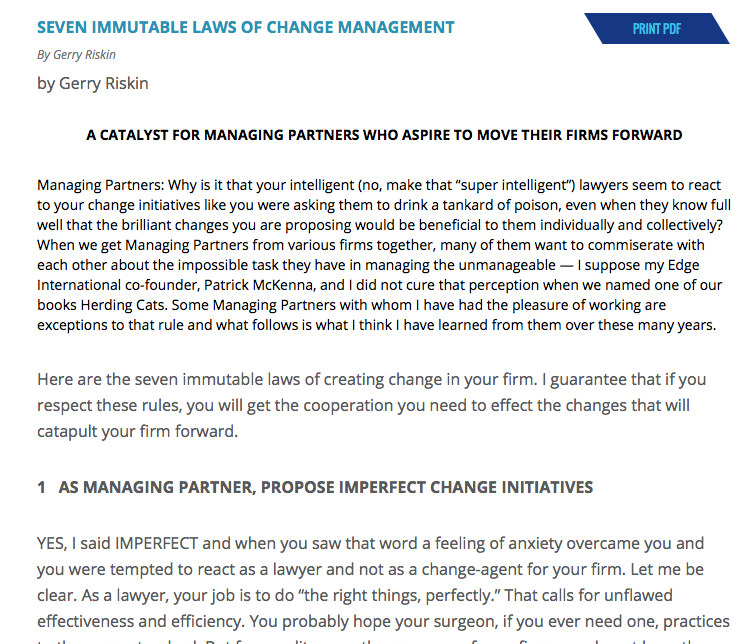
Gerry Riskin has a useful note from 2006 for Managing Partners of law firms and others interested in organizational change –Seven Immutable Laws of Change Management. The piece is useful to start thinking of the challenges of org design specific to law firms.
Here is Law number one, click through on the links below to read more from Riskin.
A CATALYST FOR MANAGING PARTNERS WHO ASPIRE TO MOVE THEIR FIRMS FORWARD
Managing Partners: Why is it that your intelligent (no, make that “super intelligent”) lawyers seem to react to your change initiatives like you were asking them to drink a tankard of poison, even when they know full well that the brilliant changes you are proposing would be beneficial to them individually and collectively? When we get Managing Partners from various firms together, many of them want to commiserate with each other about the impossible task they have in managing the unmanageable — I suppose my Edge International co-founder, Patrick McKenna, and I did not cure that perception when we named one of our books Herding Cats. Some Managing Partners with whom I have had the pleasure of working are exceptions to that rule and what follows is what I think I have learned from them over these many years.
Here are the seven immutable laws of creating change in your firm. I guarantee that if you respect these rules, you will get the cooperation you need to effect the changes that will catapult your firm forward.
1 AS MANAGING PARTNER, PROPOSE IMPERFECT CHANGE INITIATIVES
YES, I said IMPERFECT and when you saw that word a feeling of anxiety overcame you and you were tempted to react as a lawyer and not as a change-agent for your firm. Let me be clear. As a lawyer, your job is to do “the right things, perfectly.” That calls for unflawed effectiveness and efficiency. You probably hope your surgeon, if you ever need one, practices to the same standard. But face reality — as the manager of your firm, you do not have the luxury of doing only “the right things” because nobody, including you, knows what the “the right things” are except in hindsight — and hindsight is too late.
As a result, most good firms are paralyzed by the tedious, never-ending and totally ineffectual process of divining the perfect strategy accompanied by the perfect tactics. These firms are ships tied so firmly to the pier that no matter how well steered, they go absolutely nowhere. In fact, their biggest claim to fame is that they hit no icebergs — few ships do from the pier. Such firms may do “industry-average” well, but they are not going to consistently break out of the pack. Temporary successes come from individual initiatives that the firm is likely unaware of and therefore does not impede with excessive policies and standardization.
In strategy, you must make the best decisions you can with what you know and what you can speculate about. I am not against a little market research — in fact, I advocate it — but I am against the notion that you can know enough to comfortably make strategic decisions with the confidence that you are most certainly right.
Law 2: http://www.gerryriskin.com/the-seven-immutable-laws-of-change-management-law-two/
Law 3: http://www.gerryriskin.com/the-seven-immutable-laws-of-change-management-law-three/
Law 4: http://www.gerryriskin.com/the-seven-immutable-laws-of-change-management-law-four/
Law 5: http://www.gerryriskin.com/the-seven-immutable-laws-of-change-management-law-five/
Law 6: http://www.gerryriskin.com/the-seven-immutable-laws-of-change-management-law-six/
Law 7: http://www.gerryriskin.com/the-seven-immutable-laws-of-change-management-law-seven/